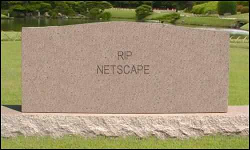
Long ago, in an internet far, far away… a search was a search.
When we searched for information on a subject and were presented with the ‘best results’, it really did offer the most relevant information – on a global scale.
Many people valued this un-personalised, un-localised and almost entirely non-commercial version of the internet as it was, ‘back in the day’. The web was arguably more effective for accessing the most pertinent, highly specialised information the world had to offer – regardless of your location, search history and individual ‘profile’ details.
Some background: I discovered the Internet relatively late, sometime in the mid 1990’s. My main use for computers up until that point had been composing and producing music, so like most people with similar interests I switched on my computer for one reason only – to load up Cubase V2.0 (from a single 1.44mb floppy disc!) and get on with writing.
Excluding the programmers, hackers and serious techno geeks, for most people computers were still either an upgrade from a typewriter or an alternative to gaming at the local arcade. I only knew one person who could have told you what an email was.
Discovering the Web
I had heard on the grapevine – a kind of language-based virtual social networking interface that only existed in the minds of people, popular among humans in the twentieth century – that if I ‘connected’ to this amazing new thing called ‘the internet’ I could find and share loads of great information from other enthusiasts about synthesizers, music creation, computers, and all the other things I loved. Apparently there was even FREE music software out there, which apparently I could ‘download’ and use in my productions.
This all sounded like it might be the single most awesome thing ever, so sure enough I bought my first copy of PC Magazine, quizzed my superior geeky mate, and soon learned enough to go out and buy a second-hand IBM PC and a modem. After several days of utter confusion I finally fired up Netscape Navigator and said hello to the worldwide web.
Using the Internet in the Early Days

The internet really was global, and the search results were very different to what you get now, almost entirely free of e-commerce and monetised sites. It’s very hard to see such on-topic and specialised results these days, without using epic advanced search operators in your queries.
When I searched the early web for information on advanced programming techniques for my JUNO-6 analogue synthesiser, that was exactly what came up in the results. I was presented with hundreds of brilliant and useful enthusiast-written pages, fan-sites and good technical information.
I am sure it was a similar experience for many people with specialised interests; in my case, there were probably only a few people in my area who even knew what a Juno 6 was. The potential for learning and growth provided by accessing the internet was unprecedented, and of immense personal value.
The commercial rot: search engines were compromised by spammy advertising

By about 2003, the same search would bring up millions of links to commercial content; irrelevant adverts, e-commerce product pages from companies who didn’t even have a Juno-6 to sell, and the worst of the lot – those utterly sickening auto generated search ‘results’ from the millions of worthless keyword squatters who definitely didn’t give a toss about the classic Juno-6. Thanks for getting rid of that lot in particular, Google.
Thankfully, huge improvements to search algorithms have partly restored my faith in the web. While searching today for Juno-6, the majority of content displayed on the first few pages is relevant, on-topic and of some interest. At least Wikipedia does the job of linking me to some smaller relevant sites that aren’t ranking well.
Web 2.0? What happened to all the old user generated content?
If web 2.0 is all about user-generated content, why are those quirky and specific Juno-6 fan-sites buried without a trace beneath hundreds of thousands of less relevant – but better funded -commercial entities?
I guess the geeky little guys don’t have brand power, aren’t interested in social media or self promotion, and they aren’t paying SEO companies to build links. It’s a shame they are gone.
Google, if you are listening; obscure should not mean invisible. Can we have a new filter button labelled “I like small random sites with nothing to sell and no budget” please?
